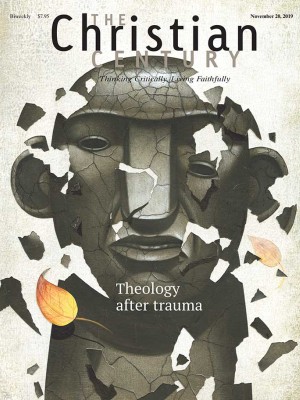December 1, Advent 1A (Matthew 24:36–44; Romans 13:11–14)
It’s troubling to imagine the Son of man arriving with criminal intent.
As Advent begins, I want to be drawn into an anticipation of joy. I yearn to have the Spirit encourage my imagination, to point my heart toward wholeness and reconciliation.
This text from Matthew does little to spark that feeling. Earlier in chapter 24, some of the disciples query Jesus about “the end of the age.” Now he is deep into answering them, imploring them to be ready for what is coming. I am troubled by what he says.
He talks about the surprise of the great flood—how people just went on living, oblivious to what was about to arrive. An end that comes with destructive force is troubling, no matter how great the new thing that emerges might be. He speaks of the end as if some will be swept up and disappear. Communities will be separated, families divided. Troubling.
Read our latest issue or browse back issues.
And then he compares the Son of man’s “coming at an unexpected hour” to that of a thief. Unexpected like a thief? That is downright terrifying.
I have a childhood memory of discovering that someone had broken into my home. My family and I returned just before evening, and the sun had almost set behind our 1920s-era bungalow. I remember being struck by the way the fading orange light obscured the details of the structure and the lone oak tree behind it. All we could see from the sidewalk was a glowing shadow, as if the gabled roof had swollen or grown a head.
As we walked up the steps, things felt amiss. It was difficult to tell in the twilight haze, but the lines of the door were off. A small triangle of darkness rested in the kick plate of the screen door. The oak door behind it, normally a burgundy rectangle, had become a trapezoid. Passing headlights reflected off its two square panes of glass and projected the mirror image of a family photograph that hung on the perpendicular wall. The door was ajar.
My mother swept my brother and me away from the door and back out to the sidewalk. My father grabbed a piece of driftwood he’d found in Lake Superior and stowed under the porch swing. He’d planned on repurposing it into furniture, not a makeshift club. He raised it in his right hand and stepped softly across the threshold.
Remembering that day, I am troubled that the Son of man might arrive with criminal intent. It seems contrary to the nature of holiness and the gift of grace. We claim he’s our Prince of Peace, not thieves.
If Jesus said this now, the story might be different. Home surveillance companies are raking in billions with the assurance that they can blanket every square foot of our residences with camera coverage. Intruders, package thieves, misbehaving pets, and even the Son of man should beware. In that scenario, I’d say I could be ready. I’d have the upper hand. That is, unless the end were to arrive like a thief during an internet outage.
I want to believe this criminal comparison is just a poorly conceived metaphor. Just a handful of verses later, Jesus speaks in more positive terms, saying the kingdom is like a wedding and being ready is about attending to the bridegroom. I want to believe this was all concocted by a sect of his early acolytes, those convinced their rabbi messiah would be back soon enough to steal them away part and parcel. I want to believe that Jesus is just in a bad mood throughout this chapter full of doom—destruction, disaster, persecution, Matthew’s patented “weeping and gnashing of teeth.”
Yet I actually believe this illustration is intentional.
That day of shadows lit in orange, when things outside our home were ajar, nothing inside seemed different. Nothing was missing. If things had been rifled through, the prowler had been meticulous about putting them back. As my brother and I nodded off in the yard, the police came and dusted for fingerprints—but if anyone had been inside, they left no trace.
“Looks like you were lucky,” an officer told my mom.
Except that for a long time every creak of the floor or rattle of the furnace made us jumpy. Every little thing that seemed different had us second-guessing that officer’s assessment. It felt as if we were constantly guarding against a ghost.
A week later, our neighbors awoke to discover a gloved man lurking around their living room by candlelight. By the time the police arrived, all they found were the doors sprung open, the same as ours.
I don’t want to admit it, but I believe the Kingdom of God has to be sneaky—because otherwise I probably wouldn’t cooperate. In perfectly apocalyptic fashion, I need to be disrupted so the true nature of my faith can be revealed.
If a new beginning is to take place, a number of things I value greatly will need to be stolen—things far more harmful than the dishonorable behaviors Paul warns against in Romans 13. I excel in divisiveness. I have perfected the art of letting anger linger. I draw strength when finding the fault in others. I refuse, quite often, to let my aims be sidelined or even interrupted.
I struggle to give any of these things up willingly. Having them stolen might be the only way I let them go.
Matthew delivers a blunt reminder: Advent can be a season to remember that what I hope for is rarely what I need, nor is the way God gives it the way I’d prefer to receive it. I’m working on being ready for that—ready enough to accept that it brings trouble with the aim of establishing joy.





